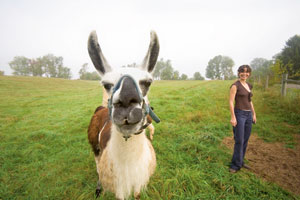Not in my Job Description: A Dancer's Muddy Boots
By Mark Ellis
 Picture the pirouette amidst a flock of chickens, the plié at the goat-milking stand, and the glissade when moving cows to pasture.
Picture the pirouette amidst a flock of chickens, the plié at the goat-milking stand, and the glissade when moving cows to pasture.
In reality, barnyard choreography is a muddy-boots contrast to the airy professional life of Julie Brodie, an associate professor of dance who teaches modern and ballet technique, composition, kinesiology, and Labanotation. Brodie and her husband, Michael Hufnagel, a registered nurse in the Knox Community Hospital emergency room, have created a farm from scratch on eighteen acres just outside Gambier. The place is a lesson in sustainability for the couple and their three young children, but it's also a realm of fun that comes with fishing poles, a budding fruit orchard, and prancing llamas.
About seven years ago the couple found an 1870s-era farmhouse with a sturdy barn. "We loved this place when we saw it," Brodie said. "We just felt if we had this space and this barn, we should be using it and it shouldn't just be cosmetic." The farmhouse is robust and comfortable, and Brodie noted that a "prissy housekeeper" might not fit in this environment.
She grew up in Illinois, where her father was a large-animal veterinarian and on the faculty at the University of Illinois. Her agricultural exposure came during tag-along trips with her dad, who visited nearby farms to help birth cows. Hufnagel spent some summer days at a relative's farm in Michigan.
"We love being out here, being on this land and doing stuff with animals," she said. "I think you have to enjoy it. We both like hard physical labor. You don't have to go to the gym. It is a lot of work, but this is our fun. I love the smell. I love the feel of it."
The family has toughened up. The squeamishness was all but gone by the time a couple of calves were castrated. And the lessons of life and death are valuable.
"It's hard at first," Brodie recalled. "The kids would cry every time an animal would die, but you become very aware of that life cycle, I think. They understand reproduction. They see it. They see the births and they see the deaths. They sort of take it for granted after a while. They do chores, and I think that's good for them."
Death sometimes arrives by predator. A mink wiped out about seventy chickens and pheasants. "It looked like a war. It was crazy." The offender was later trapped and "the outcome was not favorable."
Animals have come and gone peaceably as well. What started out as a bit of a petting zoo (one sheep, a couple of donkeys) has gradually become a more practical exercise in animal care and food production.
For example, their name for the place—Broken Oak Farm—comes from a tree that shades the pond they created and stocked with bluegill, catfish, largemouth bass, and sunfish. Fish pulled from the pond are added to a family menu that also includes farm-raised beef and chicken, eggs, goats' milk (for cooking), and cheese. A vegetable garden has led to canning.
"I really like the feeling of knowing where my food is coming from," Brodie said. "I would love, at some point, to be sustainable. We're not there yet." The family has sold milk from their four Nubian goats and some llama wool on a small scale, but the farm is not a money-maker. They rely on outside help for the llama shearing and slaughter of chickens.
The llamas add an exotic touch to the farm as well as providing wool for the stuffing of family pillows. Llamas Frankie and Ella have produced two offspring, Jackson and Viona. Although some farmers use llamas to guard sheep against predators, Brodie learned that a male llama with a family objects to sharing a pasture with cows. The Jersey cows Lolly and Pop were harassed by Frankie to the point that one of the cows tumbled down a hill and under a fence into McManis Road.
"It's quite humorous around here sometimes," Brodie said. "We just try to make it work the best we can."

 Delicious
Delicious Facebook
Facebook StumbleUpon
StumbleUpon Digg
Digg reddit
reddit